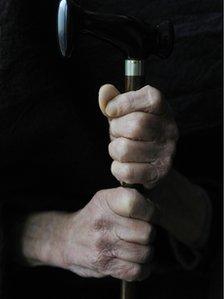One in three adults will be over 65 within 25 years
- Published

Over 65s are the fastest growing age group
The number of people aged over 65 in Wales is set to reach more than 860,000 by 2035, according to latest official projections.
This would take the total above the current combined populations for the whole of Cardiff, Swansea and Wrexham.
The proportion of people aged over 65 is expected to rise from one in four to one in three by 2035.
The Welsh Government said it has been planning for some time the demands of population growth.
Wales' population is predicted to grow from 3.17m to 3.37m, with the over-65s the fastest growing age group.
The number of over 65s currently stands at 558,000.
Although births will outnumber deaths, the main cause of population growth is expected to be immigration.
The number of people moving into Wales is projected to be about 10,000 a year - 7,000 of whom will come from other parts of the UK.
'Celebrated'
The statistics, external will prompt questions about how society pays for the public services needed by an increasingly ageing population.
The proportion of adults aged over 65 is expected to rise from one in four to one in three by 2035.
It means that for every 1,000 people of working age, there will be 450 people over 65 years old, compared to 294 last year.
Iwan Rhys Roberts, of Age Cymru, said: "We're all living longer, we're all living healthier for longer and this is something to be celebrated.
New babies
"It's common knowledge that we have an ageing population and that the population of Wales is ageing more quickly than the rest of the UK.
"The implications of this are of course that we need to have policies that meet the needs of our ageing population - from health and transport to communities that provide people of all ages with access to the services and amenities that they need to allow them to live life to the full."
The trend towards and older population comes as the number of hospital beds is reducing and there is a shift towards treating people at home, instead of in hospital, when possible.
Dr Richard Lewis, Welsh secretary of the BMA, said the changes and the arrival of new babies will put pressure on the NHS.
"It is going to put a strain on the NHS in Wales and we do need to look at how best to make health services and social care services work efficiently and in a co-ordinated way to try to mitigate some of these changes," he said.
Local councils, the voluntary sector and the NHS have come together in south-east Wales to provide frail people, most of whom are elderly, with the assistance they need to live independently.
The Gwent Frailty Project offers medical and social care to people in their own home to stop them going into hospital or care homes.
Gill Lewis, of the Gwent Frailty Project, said: "If we are going to stem the flow we have to keep people independent and wanting to look after themselves and being able to look after themselves with support.
"The system as it currently is can't be sustained, because with increasing numbers of elderly people who need some form of care and treatment if they get institutionalised they become more dependent."
A Welsh Government spokesman said it has been planning for some time the demand from population increases, which it expects to grow even more over the next two decades.
"Wales is recognised internationally for our efforts to plan for an ageing society," said a spokesman.
He said the strategy for older people, first published in 2003 and revamped in 2008 was, a real success and is due to move to a third stage in 2013
A new social services framework was also setting out priorities for the next decade.
"It aims to reshape and refocus social services in order to ensure that they remain strong, and can continue to meet citizens' needs and aspirations," added the spokesman.
"The legislation programme for Wales includes the commitment to introduce a Social Services Bill that will enable us to deliver the reforms that are needed in social cervices to meet the challenges ahead."
- Published26 October 2011
- Published24 October 2011
- Published30 June 2011
- Published5 August 2010
- Published4 July 2011